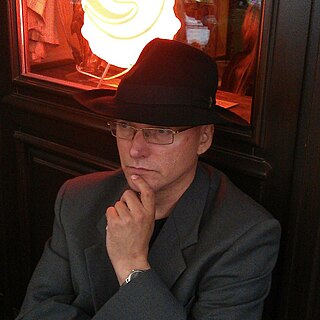Gödel's ontological proof is a formal argument by the mathematician Kurt Gödel (1906–1978) for the existence of God. The argument is in a line of development that goes back to Anselm of Canterbury (1033–1109). St. Anselm's ontological argument, in its most succinct form, is as follows: "God, by definition, is that for which no greater can be conceived. God exists in the understanding. If God exists in the understanding, we could imagine Him to be greater by existing in reality. Therefore, God must exist." A more elaborate version was given by Gottfried Leibniz (1646–1716); this is the version that Gödel studied and attempted to clarify with his ontological argument.

Gödel's completeness theorem is a fundamental theorem in mathematical logic that establishes a correspondence between semantic truth and syntactic provability in first-order logic.

Saul Aaron Kripke was an American analytic philosopher and logician. He was Distinguished Professor of Philosophy at the Graduate Center of the City University of New York and emeritus professor at Princeton University. Since the 1960s, he has been a central figure in a number of fields related to mathematical and modal logic, philosophy of language and mathematics, metaphysics, epistemology, and recursion theory.
In logic and proof theory, natural deduction is a kind of proof calculus in which logical reasoning is expressed by inference rules closely related to the "natural" way of reasoning. This contrasts with Hilbert-style systems, which instead use axioms as much as possible to express the logical laws of deductive reasoning.
In classical deductive logic, a consistent theory is one that does not lead to a logical contradiction. A theory is consistent if there is no formula such that both and its negation are elements of the set of consequences of . Let be a set of closed sentences and the set of closed sentences provable from under some formal deductive system. The set of axioms is consistent when there is no formula such that and . A trivial theory is clearly inconsistent. Conversely, in an explosive formal system every inconsistent theory is trivial. Consistency of a theory is a syntactic notion, whose semantic counterpart is satisfiability. A theory is satisfiable if it has a model, i.e., there exists an interpretation under which all axioms in the theory are true. This is what consistent meant in traditional Aristotelian logic, although in contemporary mathematical logic the term satisfiable is used instead.
Intuitionistic logic, sometimes more generally called constructive logic, refers to systems of symbolic logic that differ from the systems used for classical logic by more closely mirroring the notion of constructive proof. In particular, systems of intuitionistic logic do not assume the law of the excluded middle and double negation elimination, which are fundamental inference rules in classical logic.
Modal logic is a kind of logic used to represent statements about necessity and possibility. It plays a major role in philosophy and related fields as a tool for understanding concepts such as knowledge, obligation, and causation. For instance, in epistemic modal logic, the formula can be used to represent the statement that is known. In deontic modal logic, that same formula can represent that is a moral obligation. Modal logic considers the inferences that modal statements give rise to. For instance, most epistemic modal logics treat the formula as a tautology, representing the principle that only true statements can count as knowledge. However, this formula is not a tautology in deontic modal logic, since what ought to be true can be false.
In classical logic, intuitionistic logic, and similar logical systems, the principle of explosion is the law according to which any statement can be proven from a contradiction. That is, from a contradiction, any proposition can be inferred; this is known as deductive explosion.
In mathematical logic, Löb's theorem states that in Peano arithmetic (PA) (or any formal system including PA), for any formula P, if it is provable in PA that "if P is provable in PA then P is true", then P is provable in PA. If Prov(P) means that the formula P is provable, we may express this more formally as
In logic, a rule of inference is admissible in a formal system if the set of theorems of the system does not change when that rule is added to the existing rules of the system. In other words, every formula that can be derived using that rule is already derivable without that rule, so, in a sense, it is redundant. The concept of an admissible rule was introduced by Paul Lorenzen (1955).
In philosophical logic, the concept of an impossible world is used to model certain phenomena that cannot be adequately handled using ordinary possible worlds. An impossible world, , is the same sort of thing as a possible world , except that it is in some sense "impossible." Depending on the context, this may mean that some contradictions, statements of the form are true at , or that the normal laws of logic, metaphysics, and mathematics, fail to hold at , or both. Impossible worlds are controversial objects in philosophy, logic, and semantics. They have been around since the advent of possible world semantics for modal logic, as well as world based semantics for non-classical logics, but have yet to find the ubiquitous acceptance, that their possible counterparts have found in all walks of philosophy.
In mathematics and logic, Ackermann set theory is an axiomatic set theory proposed by Wilhelm Ackermann in 1956.
In mathematics and philosophy, Łukasiewicz logic is a non-classical, many-valued logic. It was originally defined in the early 20th century by Jan Łukasiewicz as a three-valued modal logic; it was later generalized to n-valued as well as infinitely-many-valued (ℵ0-valued) variants, both propositional and first order. The ℵ0-valued version was published in 1930 by Łukasiewicz and Alfred Tarski; consequently it is sometimes called the Łukasiewicz–Tarski logic. It belongs to the classes of t-norm fuzzy logics and substructural logics.
In logic and philosophy, S5 is one of five systems of modal logic proposed by Clarence Irving Lewis and Cooper Harold Langford in their 1932 book Symbolic Logic. It is a normal modal logic, and one of the oldest systems of modal logic of any kind. It is formed with propositional calculus formulas and tautologies, and inference apparatus with substitution and modus ponens, but extending the syntax with the modal operator necessarily and its dual possibly.
Philosophy of logic is the area of philosophy that studies the scope and nature of logic. It investigates the philosophical problems raised by logic, such as the presuppositions often implicitly at work in theories of logic and in their application. This involves questions about how logic is to be defined and how different logical systems are connected to each other. It includes the study of the nature of the fundamental concepts used by logic and the relation of logic to other disciplines. According to a common characterisation, philosophical logic is the part of the philosophy of logic that studies the application of logical methods to philosophical problems, often in the form of extended logical systems like modal logic. But other theorists draw the distinction between the philosophy of logic and philosophical logic differently or not at all. Metalogic is closely related to the philosophy of logic as the discipline investigating the properties of formal logical systems, like consistency and completeness.
In the philosophy of religion, an ontological argument is a deductive philosophical argument, made from an ontological basis, that is advanced in support of the existence of God. Such arguments tend to refer to the state of being or existing. More specifically, ontological arguments are commonly conceived a priori in regard to the organization of the universe, whereby, if such organizational structure is true, God must exist.
In quantified modal logic, the Buridan formula and the converse Buridan formula (i) syntactically state principles of interchange between quantifiers and modalities; (ii) semantically state a relation between domains of possible worlds. The formulas are named in honor of the medieval philosopher Jean Buridan by analogy with the Barcan formula and the converse Barcan formula introduced as axioms by Ruth Barcan Marcus.
In mathematical logic, the hypersequent framework is an extension of the proof-theoretical framework of sequent calculi used in structural proof theory to provide analytic calculi for logics that are not captured in the sequent framework. A hypersequent is usually taken to be a finite multiset of ordinary sequents, written

Frode Alfson Bjørdal is philosophy professor emeritus at the University of Oslo, Norway.
A non-normal modal logic is a variant of modal logic that deviates from the basic principles of normal modal logics.




